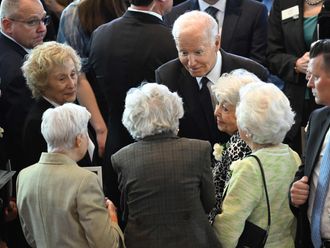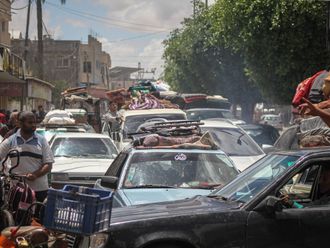
London: The London-accented militant who delivered blood-curdling threats to the West before apparently beheading two American journalists has become, for most Britons, the masked face of foreign fighters in Syria.
But more typical, experts say, may be the Brit who recently called home from the front lines to say he’s fed up.
“The whole jihad was turned upside down,” the militant recently told Shiraz Maher, a senior researcher for the International Center for the Study of Radicalisation at King’s College London. “Muslims are fighting Muslims. I didn’t come for that.”
The disillusioned fighter who recently contacted Maher, the King’s College researcher, said he is fighting in Syria alongside 30 Britons.
“Many people left to help the Syrian people. Then we got labelled as terrorists,” Maher quoted the militant as saying. “Now people want to come back, not to attack but because they found out jihad is not what they thought.”
Peter Neumann, Maher’s colleague at King’s College, said the government would be missing an opportunity if it did not allow some of those disillusioned fighters to return on the condition that they participate in a deradicalisation programme and submit to monitoring by the domestic intelligence agency, MI5.
“Clearly, people like that could become very powerful spokespeople that you could send into Muslim communities to speak out against [the Islamic State],” he said. “All the government is currently offering is to say, ‘We’re going to lock you up for 20 to 30 years,’ which is appropriate for very hardened extremists. But for the ones we are talking about, there should be another option.”
The fighter’s disillusionment, experts say, has become a recurring theme among some of the thousands of young men and women from around the globe who have answered the Islamic State of Iraq and the Levant’s call for holy war but have found the reality is significantly less glorious than what they were promised.
For those trying to stanch the flow of fighters and combat extremism here in Britain, it’s a perspective that could be the perfect antidote to Isil propaganda. And yet it’s one that is seldom if ever heard here, in part because of government policy that focuses on keeping Brits who have gone to war from returning home — and locking them up if they even try. Hanif Qadir, chief executive of the Active Change Foundation, an anti-extremist group. said that the government should realise that Brits who went to Syria to fight and became disillusioned while there can be some of the most effective spokespeople against the lure of Isil.
“They’ve been sold a lie. They didn’t sign up for this sort of barbaric behaviour, and now they want out,” said Qadir. “A lot of them feel trapped by Isil not letting them go, and by the British government not letting them back,” said Richard Barrett, a former counterterrorism director with Britain’s foreign intelligence service, MI6. “But if you want people to understand that it’s bloody terrible out there, you have to hear from these people.”
The government has good reason to be extremely wary of allowing former fighters to come home after war-zone experiences that have left many more radical than ever — and possibly determined to strike the West.
British Prime Minister David Cameron recently called the prospect that they could return and carry out attacks here “a greater and deeper threat to our security than we have known before”. On the same day, British security services raised the terror threat level to “severe”, meaning an attack on British soil is now considered “highly likely”.
The government’s response has been to crack down hard on those suspected of planning to travel to Syria, as well as those who may have already been. With the war in Syria little more than a budget-airline flight away, thousands of Europeans have been drawn in, including some 500 Britons. British police have arrested 69 people this year on suspicion of joining the fight.
To keep militants from slipping through, Cameron has sought to close loopholes in the law, including giving police the power to temporarily confiscate passports as fighters attempt to come and go at airports.
London Mayor Boris Johnson, touted as a possible future prime minister, has gone further, suggesting suspected fighters be presumed guilty until proven innocent and should be stripped of their citizenship.
Such tough talk has dominated the discourse here, with little attention given to the idea of allowing some fighters to return and funnelling them through a comprehensive deradicalisation programme.
For many who understand the homegrown extremism problem best, the current approach could be dangerously counterproductive.
“If you stop them from coming back, you’re going to create more grievances, and more reasons for this country to be targeted,” said Qadir, “If we don’t leave a doorway open for them, they’re going to become more radicalised.”
Qadir knows the problem intimately. Appalled by reports of American airstrikes killing innocent civilians, he travelled to Pakistan and Afghanistan in 2002. He went with the intention of performing humanitarian work but said he was also attracted to the Taliban’s rhetoric of struggle against a foreign occupier and was prepared to fight alongside the insurgent group. Instead, he was repelled by what he found.
“If American soldiers were being hostile toward innocent civilians, so were Al Qaida and the Taliban,” Qadir said. “This was hypocrisy.”
Qadir soon returned to Britain. The following year he launched ACF in an attempt to halt the spread of extremism in the northeast London neighbourhood of Walthamstow, a community of neat, stucco-faced row-houses where fish-n-chip joints dot the landscape alongside designer-hijab shops and travel agencies that specialize in pilgrimages to Makkah.
“You can’t look at these individuals as potential threats. You have to look at them as potential assets.”












